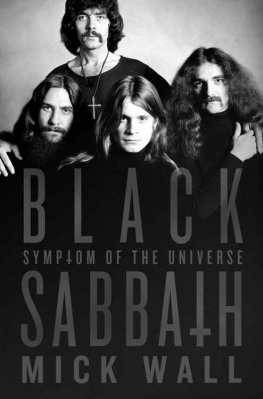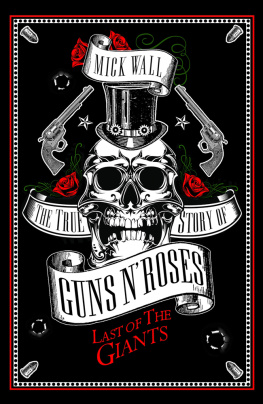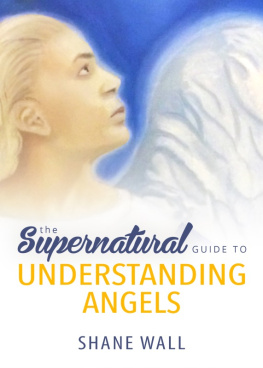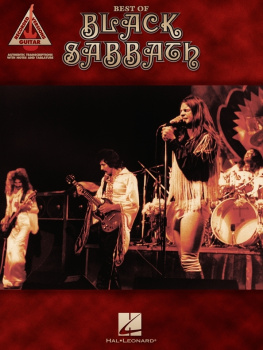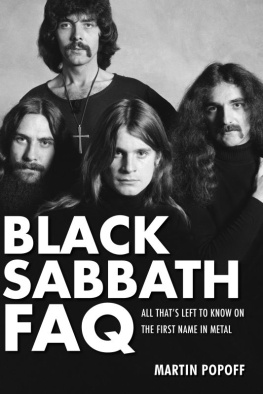
The author and publisher have provided this e-book to you for your personal use only. You may not make this e-book publicly available in any way. Copyright infringement is against the law. If you believe the copy of this e-book you are reading infringes on the authors copyright, please notify the publisher at: us.macmillanusa.com/piracy.
CONTENTS
Linda Wall, Malcolm Edwards, Robert Kirby, Jane Sturrock, Nicola Crossley, Ian Preece, Dee Hembury-Eaton, Lynnette Lawrence, Vanessa McMinn, Wendy Dio, Joel McIver, Harry Paterson, Joe Daly, Paul Clark, Glenn Hughes, Neil Murray, Mark Handsley, Hamish Barbour, Steve OHagan, Dave Everley, Jim Simpson, Vivian Campbell, Kathy and Kelle Rhoads, Dana Strum, Holly Thompson, and of course all the various members of Black Sabbath that I have had the pleasure and occasional pain of knowing over the years.
They were scum and they knew it. Human debris from the shitty, bomb-cratered streets of a post-war British nowhere named Aston. Black Country misfits with no future they could see and a past they would never escape. Musical interlopers that would always be found out; revealed for what they knew they were: the lowest of the low. A joke no one found funny, least of all the clown that stood at its front. For as Ozzy Osbourne would tell you, not a trace of a smile on his melancholy jesters face, We were four fucking dummies from Birmingham, what did we know about anything?
Their timing would always be bad. Too late for the sky-touching summer of love, too early for the rocknroll genocide of glam, they were Black Sabbath and no matter what the musical revisionists would say of them one day, long after it ceased to matter, they were the most reviled rock band on the planet. People whispered of Led Zeppelin, told of their secret magic and insatiable lust for power; others stood in awe of Deep Purples telepathic musical prowess. Hendrix was still alive and so were Brian, Jimi and Janis. Rock was on high yet Sabbath were oh, so very low. Critics outsiders, cunts, mainly from London simply could not relate. The kids, though, they loved them the way only kids can. Like crafty cigarettes in your bedroom, windows cracked open; like stealing coins from your mums purse when she was out, or finding a porno mag under your dads bed; like a first glimpse of the cold fires of hell, body oscillating with the feeling of filthy inescapability.
Nobody fidgeted more uncomfortably at a Black Sabbath show, though, almost paralysed by self-loathing, than the four band members themselves. As their lyricist and bass player, Geezer, would later lament, For years we went around thinking we were shit the press hated us, said we couldnt write, couldnt play other bands hated us, everyone. Something that could be heard all too clearly in their music: those crucifixion guitar riffs, nailed in with such heavy relish, framed by storm-gathering bass and head-rattling drums, together making a sound like that of a body being dragged from a river. Those eerie singsong vocals: as dramatic and pitiful as the sound of a swan dying. Full of cobwebbed yearning, of self-harm and picked scabs and the shriek of lost souls. The three of them zombie-walking around the stage in their preposterous crosses and moustaches, while the fourth self-combusted at the back, mouldering in his own poisons, the quad combining to ensure a fifth element: the pockmarked face of the most brutally deformed style of rock ever allowed to push its way, stinking and blood-cowed, among us.
Tony Iommi was the leader. Follower of the left-hand path, no noble speechmaker he, no bringer of messages from on high, but a true musical alchemist, the flint-eyed general in whose hands the guitar became both a wand and a war machine. An only child who had always got his own way, never any need to explain, Tony did not take no for an answer, did not waste words nor suffer fools gladly. Tony has fists like fucking hammers, Ozzy would recall, his pained animal eyes still round with the memory of their bruising attentions. Somebody had to crack the whip, Tony responded, typically stone-faced. And that was me. It was Tonys riffs that laid the foundation stone for the Sabbath sound, like a drill burrowing into the underground caves of the tallest mountains, until even they came toppling down, terrifying boulders colliding through the undergrowth, thunderbolts zigzagging across the sky at his command.
After Tony Iommi there was Terry Butler nicknamed Geezer, after a childhood affectation for calling everyone he met Geezer, which the adults laughed at and found charming, and because of which became the name he retained throughout the stunted growth of his own adulthood, along with everything else from his youngest days: the need to be mollycoddled; to be stroked and petted and constantly reassured, constantly adored. The bright boy of the class, good with words, teachers pet, good at staying out of trouble, or never being caught out, which meant the same thing to him. Clever Geezer it would be that came up with all of Sabbaths lyrics, because, Ozzy said, Geezers got a great brain. He could play too, swinging the bass like a guitar, bending the heavy strings, weighing each note, then catapulting it forward, just like his hero, Jack Bruce, he said, Who shadowed the riff rather than copying it.
Then there was Bill Ward, a brilliant if wayward percussionist who loved jazz, especially the crazed Gene Krupa, and who would forever be treated as the joker in the pack. Poor old Bill, the one they set fire to not just once, and never by accident, but as a matter of habit. The one they laughed at not behind his back but right into his face. Bill, who saw it all from his perch, sweating bullets at the back of the stage, arms flailing, legs spasming, always out of breath, always running to stand still convincingly, always the last to know what even the others, who always knew last, might know first. Poor old Bill, the one who would remain the most honest and would pay the heaviest price for it, kicked repeatedly until he refused finally to get up again.
And of course there was Ozzy or Ossie, as he was dumbly credited on the first Black Sabbath album. Since The Osbournes turned him into a family-friendly, panda-eyed cuddly toy, Ozzy has been denuded of the credibility he once enjoyed as a rock singer. He never had much in the first place, forced to stand at the side of the stage, jumping up and down like a caged gorilla, as Iommi hogged the centre-stage spotlight. Yet there was something about him, for those that tuned in, that spoke of a truly unresolved problem; some echo of rocks original spirit of incoherent, bleary-eyed helplessness that could not be learned or faked; something uncomfortably real. As a fan, you wanted to be Robert Plant or maybe John Lennon. You never wanted to be Ozzy. It was all right to be a tormented romantic soul: a Rod Stewart or even an Elton John. It was an entirely different thing to want to suffer actual pain, to know that youre mad, that youve always been mad. To know, finally, that one day you really might lose your fucking mind.
* * *
Yet underneath it all they were so ordinary, so plain, so bleeding obvious. All born within a year of each other 1948 all growing up on the same dingy streets, victims of the same dour post-war schooling and slums, there was good reason why they all looked so much alike in person and onstage. Wrought from the same black matter as their music, none of them could have made it in any other band, though they all tried, despairingly, until fate finally forced them together, against their wills, one typically downcast day in 1968, after factory closing time, before the pubs opened, only their cheap pack-of-five cigarettes to warm them.
Next page
